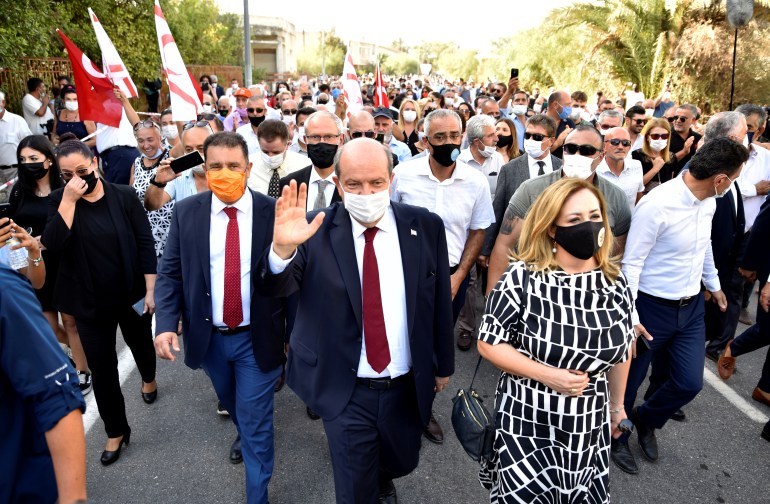Greece, Cyprus threaten EU sanctions against Turkey over Varosha
Athens, Greece – Greece has said that unless Turkey reverses the reopening of parts of Varosha on Cyprus’s east coast, it may seek to trigger economic sanctions that the European Union has lined up.
On Thursday, Turkish troops reopened parts of the resort that became a ghost town during the war in 1974, sparking controversy days ahead of an election in Northern Cyprus.
“Turkey needs to take a step back. If it doesn’t, next week both Cyprus and Greece will table the matter for discussion by EU leaders at the October 16-17 European Council,” said Greek government spokesman Stelios Petsas on Thursday.
EU members Greece and Cyprus sought sanctions against Turkey last week, in retaliation for Turkish exploration for oil and gas off the coast of Cyprus.
Greek Prime Minister Kyriakos Mitsotakis has condemned the move to reopen Varosha.
“This decision is a clear violation of UN Security Council resolutions. Greece will support all relevant efforts of the Republic of Cyprus,” he said.
Varosha was evacuated and became a no-man’s land when Turkey invaded Cyprus in 1974, in response to a Greek-inspired coup on the island.
Greek Cypriots now live in the Republic of Cyprus in the south of the island, while Turkish-Cypriots live in a northern enclave still occupied by Turkish troops.
The UN has called for Varosha to be handed back to its former Greek-Cypriot inhabitants, or at least to the UN peacekeeping force UNFICYP.
The latest move by Turkey risks upending decades of efforts to achieve a political reunification of the island as a federal, bi-communal state.
It is also a slap in the face of the EU, which last week resisted Greek and Cypriot calls for sanctions over Turkey’s hydrocarbon exploration in the region.
On October 2, the EU said it “strongly condemns the violations of the sovereign rights of the Republic of Cyprus which must stop,” but did not explicitly mention sanctions.
On Thursday, Mitsotakis and European Commission president Ursula von der Leyen issued a joint statement calling on Turkey to respect past UN Security Council resolutions.
But Turkish and Turkish Cypriot officials insist the move to reopen parts of Varosha will not affect the rights of Greek Cypriot property owners since it is only the beach that is opening for now.
Election interference
Turkish President Recep Tayyip Erdogan announced the reopening of Varosha on Tuesday, in a joint press conference with the prime minister of the Turkish-Cypriot community, Ersin Tatar.
Turkish-Cypriot leader Mustafa Akinci believes the move is an attempt to influence the outcome of Sunday’s presidential elections in the north of the island.
He called the announcement from Ankara a “shame for our democracy” and “interference in our elections”.
Unlike other cabinet members, Akinci is in favour of greater independence from Turkey, which bankrolls the Turkish-Cypriot enclave and stations some 35,000 troops there.
 Ersin Tatar, presidential candidate for the Turkish Cypriot elections, in Varosha [Harun Ucar/Reuters]
Ersin Tatar, presidential candidate for the Turkish Cypriot elections, in Varosha [Harun Ucar/Reuters]Petros Liakouras, Professor of International Relations at the University of Piraeus, told Al Jazeera that Ankara is supporting the enclave’s foreign minister Kudrey Ozersay as the next president.
“But I don’t think he’s going to win. I think Akinci will be the winner in the second round,” Liakouras said.
“Akinci really is promoting the interests of Turkish-Cypriots, which are different from the interests of those who became Turkish-Cypriots after 1974 with the settlement policy.”
The Turkish-Cypriot population of the island has grown from 80,000 in 1974 to more than 200,000, partly due to Turkish moves to encourage its citizens to resettle on the island through inducements such as free housing.
Akinci has publicly spoken against reopening Varosha.
Last February, he earned the ire of the Erdogan government by expressing fears that if continuing efforts to reunify the island do not proceed apace, Northern Cyprus is in danger of becoming annexed by Turkey, a prospect he called “horrible”.
 Greek Cypriots protest at Deryneia checkpoint [Yiannis Kourtoglou/Reuters]
Greek Cypriots protest at Deryneia checkpoint [Yiannis Kourtoglou/Reuters]‘Strategic point’
Cyprus has accused Turkey of consistently defying UN resolutions on the island.
In November 1974, three months after the invasion, the UN General Assembly called for the “speedy withdrawal of all foreign armed forces” on Cyprus, to no effect.
A series of UN Security Council resolutions has specifically called on the Turkish army to relinquish its control of Varosha.
In 1977, after Turkey first expressed its wish to settle mainland Turks in Varosha, Resolution 414 called on all parties to refrain from “unilateral actions anywhere in Cyprus that may adversely affect the prospects for a just and peaceful solution”.
After Turkey declared the northern enclave an independent Turkish Republic of Northern Cyprus in 1983, which only Ankara recognises, Resolution 550 again said Security Council members were “deeply concerned about recent threats for settlement of Varosha by people other than its inhabitants”.
In 1992, Resolution 789 said that if Varosha could not be returned to its Greek-Cypriot inhabitants, it should at least be put under the control of the UN’s UNFICYP.
As recently as July this year, the Security Council continued to call for the implementation of past resolutions on Varosha.
Liakouras believes Turkey has strategic reasons for occupying Varosha.
“Famagusta is a very strategic point. Turkey maintains its military in Cyprus to give it a greater say in the Middle East. It wants from there to control Lebanon and Syria, and offer help to Palestine,” he said.
“Turkey would very much like, and it has said this, to establish a naval base just north of Famagusta … from which to launch a rapid reaction force to control this whole area.”
Source: Thanks AlJazeera.com